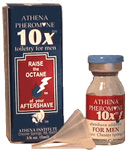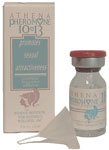Biologist Suspects Hysterectomy Impairs Sexual Attractiveness
Dr. Winnifred Cutler addressed the
INTERNATIONAL SOCIETY OF PSYCHOSOMATIC OBSTETRICS AND GYNECOLOGY at their 1999 annual meeting in Washington, DC.
*Please click here for more on pheromones and books from Athena Institute
An excerpt from her oral presentation:
Hysterectomy is a problem in the United States. Data suggest that 1 out of 2 women is prescribed a hysterectomy, and ninety percent of the time the surgery is elective, not needed. After hysterectomy, many women claim to lose the capacity to attract sexual attention from their husbands and lovers.
When women voice this complaint to their doctors, they are often prescribed psychotherapy and told that there is no basis for that in biology.
It turns out there is a powerful biological basis for a loss of sexual attraction after hysterectomy. Dr. Richard Michael conducted and published his research on monkeys in 1971 which showed that normal intact monkeys will "present" to attract the sexual attention of male monkeys. There are pheromones emitted when the female "presents"; the males come around, sniff, and behave accordingly. Any hysterectomized female monkey who has her ovaries removed instantly loses her capacity to attract attention even though she will "present" to try to get it. Unless her sex hormones are replaced in proportion to what has been lost.
We know today that hysterectomized women are usually not prescribed more than estrogen - or a maybe little testosterone, but they are almost never prescribed progesterone. It probably takes estrogen, progesterone and testosterone cycling in the proper way of a young fertile sexually attractive woman to cause a hysterectomized woman to emit pheromones naturally.
Same thing apparently occurs for a monkey. Pheromones from an intact monkey applied to the rear-end of a hysterectomized monkey will restore her capacity to attract attention from the male. Just immediately! These studies have been published in the journals, Science and Nature, and known for 25 years but not appreciated by the medical people who serve hysterectomized women who complain of a loss of sexual attractiveness.
One exception is Dr. Clark Bundren of the University of Oklahoma who tested the Athena Institute's synthesized female pheromone formula on post-hysterectomized patients taking hormone replacement therapy and complaining that they had lost the capacity to attract their husbands' sexual interest. Dr. Bundren terminated his study because of positive results.
He was quoted in the Medical Post newspaper (11/14/95) saying 70% of post-hysterectomized women using pheromones report incresased sexual activity.
Dr. Cutler's pheromone science has been "bottled" into vials of unscented fragrance additives that increase wearers' sexual attractiveness. AVAILABLE FOR PURCHASE HERE

